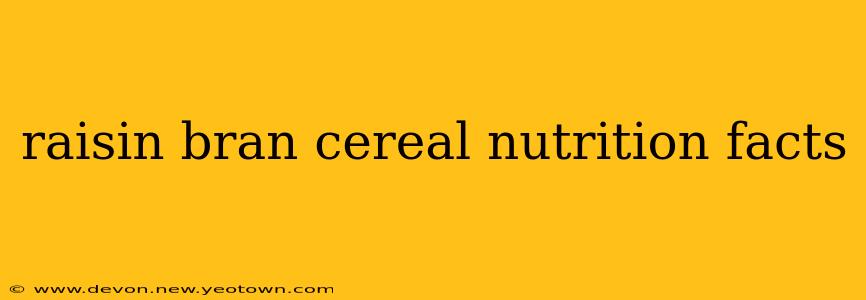Raisin Bran. The name conjures images of a wholesome breakfast, a sweet start to the day. But beyond the enticing aroma and familiar taste, what's the real nutritional story behind this classic cereal? Let's delve into the details, exploring everything from its vitamin content to its impact on blood sugar levels. We’ll even tackle some frequently asked questions to give you a complete picture.
What are the nutritional benefits of Raisin Bran?
Raisin Bran offers a blend of benefits stemming from both its bran and raisin components. The bran, the outer layer of the wheat kernel, is a powerhouse of fiber. This fiber is crucial for digestive health, promoting regularity and helping to maintain a healthy gut microbiome. Fiber also contributes to feelings of fullness, which can aid in weight management. The raisins, on the other hand, provide natural sweetness and a dose of antioxidants, compounds that protect your cells from damage. This combination makes Raisin Bran a potentially good source of both fiber and antioxidants, although the specific amounts vary depending on the brand and serving size.
How much fiber is in a serving of Raisin Bran?
The fiber content in Raisin Bran is a key selling point. A typical serving (about ¾ cup) generally contains around 5-7 grams of fiber. This represents a significant portion of the recommended daily intake of fiber, which is typically around 25-30 grams for adults. It's important to note, however, that different brands may have slightly varying fiber levels, so always check the nutrition label on your specific box.
Is Raisin Bran good for weight loss?
While Raisin Bran isn't a magic weight-loss bullet, its high fiber content can contribute to a healthy weight management strategy. The fiber helps you feel fuller for longer, potentially reducing overall calorie intake throughout the day. However, it's crucial to remember that portion control is key. Enjoying a reasonable serving size as part of a balanced diet and regular exercise routine is essential for weight loss. Overdoing it on even a "healthy" cereal like Raisin Bran can negate its potential benefits.
Is Raisin Bran high in sugar?
This is where things get a little more nuanced. While Raisin Bran contains natural sugars from the raisins, it also often contains added sugars. The amount of added sugar can vary considerably between brands and even different formulations within a brand. It's crucial to check the nutrition label carefully and opt for lower-sugar options if you're watching your sugar intake. Comparing the added sugar content to your daily recommendations is a helpful practice. Remember, too much added sugar can contribute to weight gain and other health problems.
Does Raisin Bran raise blood sugar?
The high sugar content, both from raisins and potentially added sugar, means that Raisin Bran can indeed raise blood sugar levels, especially in individuals with diabetes or insulin resistance. The fiber does help to moderate this effect to some extent, slowing down the absorption of sugar into the bloodstream. However, it's important for those with blood sugar concerns to consume Raisin Bran in moderation and possibly pair it with foods that are low on the glycemic index to minimize the impact on blood sugar. Consulting with a doctor or registered dietitian is advisable for personalized guidance.
What are the potential downsides of eating Raisin Bran?
While Raisin Bran offers some nutritional benefits, it's not without potential downsides. The relatively high sugar content is a concern for many, particularly those managing their blood sugar levels. Additionally, some individuals might experience digestive discomfort from the high fiber content, especially if they aren't used to consuming a lot of fiber. Starting with smaller portions and gradually increasing intake can help mitigate this issue. Finally, it’s important to remember that Raisin Bran is primarily a source of carbohydrates, not a complete protein source. It should be part of a balanced meal containing a variety of nutrient sources.
Conclusion: Enjoy in Moderation
Raisin Bran can be a satisfying and relatively nutritious part of a balanced breakfast, providing fiber and antioxidants. However, it's essential to be mindful of the sugar content and consume it in moderation. Always check the nutrition label, compare different brands, and consider your individual health needs before making it a regular part of your diet. Remember, a healthy diet is a balanced diet.

